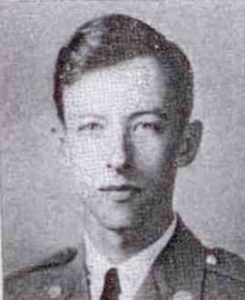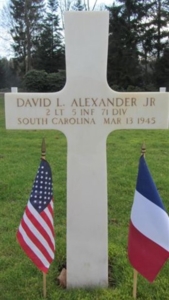Scroll of Honor – Charles Edward Coleman
First Night
Written by: Kelly Durham
At the end of the 1942-43 academic year, David Lawrence Alexander, Jr. and the rest of his Class of 1944 bade farewell to the Clemson campus. They were headed off to war, a war from which many would never return.
Alexander arrived at Clemson in 1940. A mechanical engineering major from Aiken, he was assigned to Company B, 1st Battalion, 1st Regiment of the Cadet Brigade. When the spring semester ended in 1943, Alexander and most of the rest of Clemson’s cadets were ordered to report for Army basic training. With his experience as a Clemson cadet, Alexander did well enough in basic to qualify for Officers’ Candidate School.
While Alexander continued his Stateside training, America’s fortunes were improving. In the Pacific, Marine and Army forces were winning grueling battles in New Guinea and at Guadalcanal. In Europe, Sicily was conquered and Italy invaded. Then came the invasion of France on D-Day. The change in the momentum of the war came with a steep price tag. In a seventy-five day campaign in Normandy, the Allies suffered nearly 210,000 casualties including almost 40,000 dead. Casualty rates were highest, as one would expect, among the frontline infantrymen. In Normandy, some divisions experienced casualty rates as high as 100% among enlisted soldiers and 150% among junior officers, the lieutenants and captains leading platoons and companies. According to historian Stephen Ambrose, one regiment of the 90th Infantry Division lost platoon leaders at a rate of 48%–per week.
 With Germany far from defeated, the need for replacements, particularly among the infantry, was acute. To meet the increasing manpower need, the Army shipped individual replacements to existing divisions and deployed fresh divisions that had been organized and trained in the United States. Second Lieutenant David Alexander was assigned to the 71st Infantry Division which was among the last US infantry divisions committed to combat in Europe. It arrived at Le Havre, France in early February 1945. After in-theater training, the 71st moved east in March and relieved the 100th Infantry Division at Ratzwiller in the Vosges Mountains of eastern France. The mission of the 71st was to continue to push the Germans out of France, across the Rhine River, and into Germany.
With Germany far from defeated, the need for replacements, particularly among the infantry, was acute. To meet the increasing manpower need, the Army shipped individual replacements to existing divisions and deployed fresh divisions that had been organized and trained in the United States. Second Lieutenant David Alexander was assigned to the 71st Infantry Division which was among the last US infantry divisions committed to combat in Europe. It arrived at Le Havre, France in early February 1945. After in-theater training, the 71st moved east in March and relieved the 100th Infantry Division at Ratzwiller in the Vosges Mountains of eastern France. The mission of the 71st was to continue to push the Germans out of France, across the Rhine River, and into Germany. 
On March 13, 1945, Second Lieutenant Alexander was killed in action during his first night in combat near Bitche, about six miles west of the German border.
David Lawrence Alexander, Jr. was awarded the Purple Heart and was survived by his parents. He is buried at the Epinal American Military Cemetery in France.
For more information on Second Lieutenant David Lawrence Alexander, Jr. see:
https://soh.alumni.clemson.edu/scroll/david-lawrence-alexander-jr/
For additional information about Clemson University’s Scroll of Honor visit:
